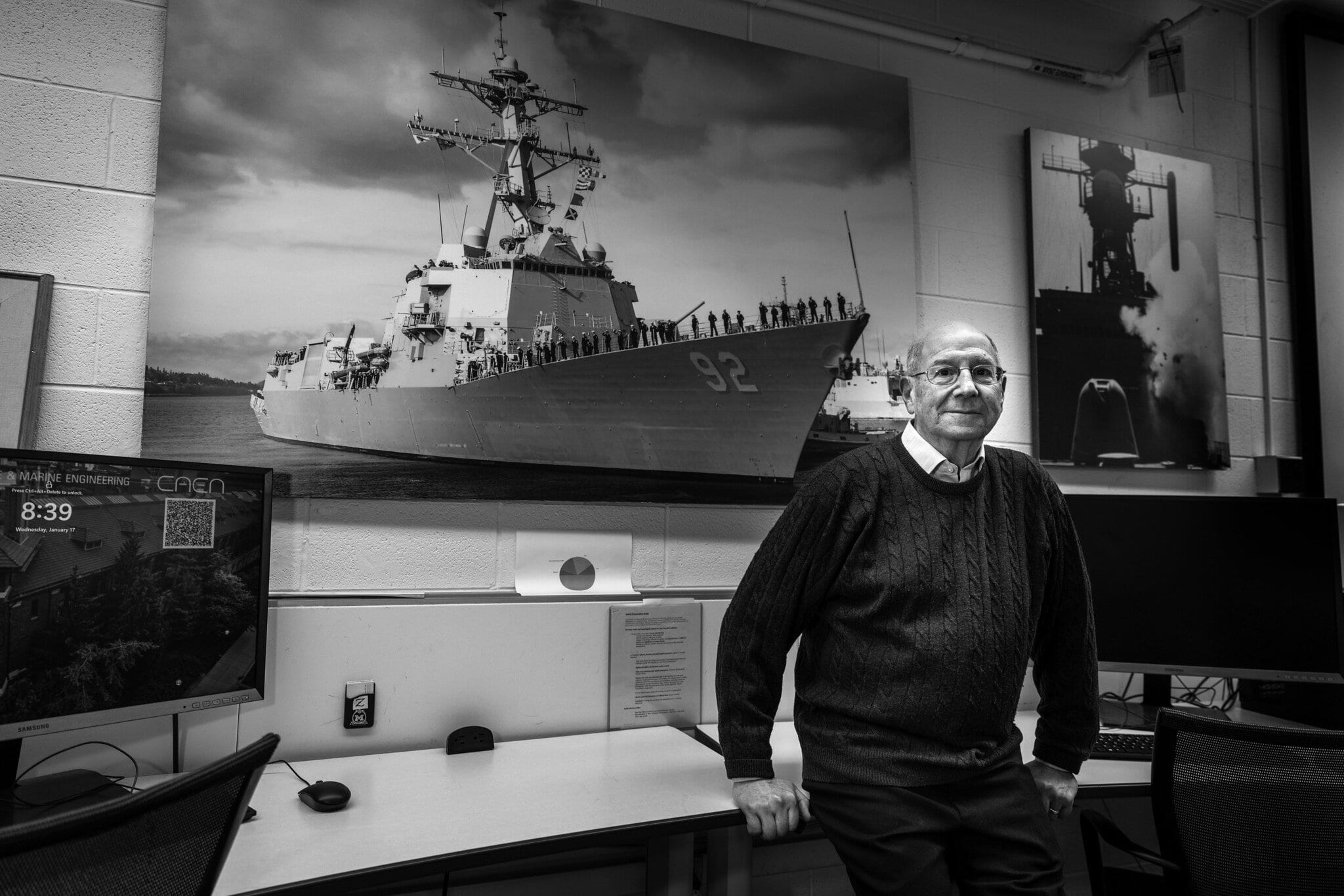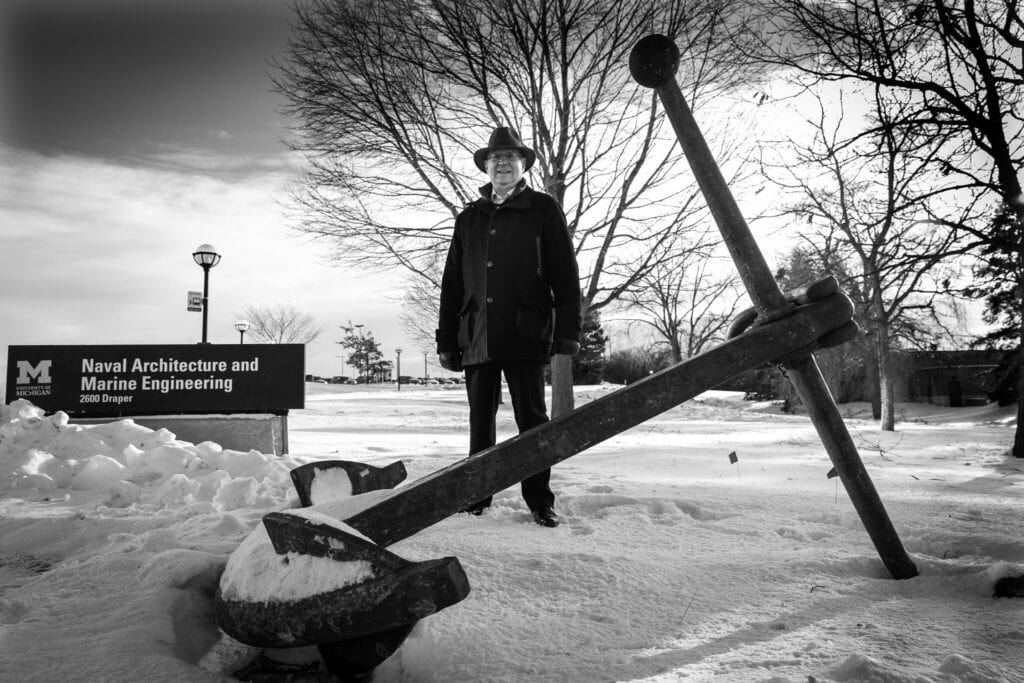
Advancing national security on all fronts
NAE profile: Donald Winter, naval architecture and marine engineering, and aerospace engineering

NAE profile: Donald Winter, naval architecture and marine engineering, and aerospace engineering
A physicist by training, Donald Winter led early research on a central piece of Ronald Reagan’s proposed space-based defense system that became known as Star Wars. The Reagan administration envisioned a ring of orbiting lasers that could intercept and destroy nuclear missiles. Winter’s project, code-named Talon Gold, involved a telescope-like tracking and targeting mechanism to aim the lasers. As with most of his research contributions, the details are classified. Before and after his time at the Defense Advanced Research Projects Agency (DARPA), he worked in research and development and then held high-ranking positions at aerospace technology firm and defense contractor TRW Systems and Northrop Grumman. For his contributions to high-powered laser technology and defense systems, he was elected to the National Academy of Engineering in 2002. View the NAE citation.
Get to know Michigan Engineering’s National Academy of Engineering members.
Winter was appointed Secretary of the Navy under George W. Bush, after which time he spent a decade advising the Australian government as they rebuilt the Royal Australian Navy fleet. He recently served as a senior defense industry advisor for Ukraine in the U.S. Department of Defense (DoD). During his time in industry, he worked on classified satellites as well as NASA’s Chandra X-ray Observatory. He chaired NAE’s committee to investigate the Deepwater Horizon explosion and oil spill and taught at U-M as professor of engineering practice. He is chair of NAE until July 2024.
Winter’s research and leadership have been instrumental to U.S. national defense for decades. And although Star Wars was never implemented, his work on laser tracking and targeting paved the way for further strategies.
More on Don Winter

Winter: “I was a graduate student at Michigan from ‘69 to ‘72. I got my master’s and PhD in physics. But I did my dissertation work here on North Campus. I was working at Willow Run Laboratories in the radar and optics division, which was a fascinating experience in the early days of holography.
“Then I went out to California and joined a company called Thompson, Ramo and Wooldridge, or TRW. It was basically an aerospace and defense company. That’s where I spent most of my early professional career, except for a couple years at DARPA.
“At TRW I started in the research laboratories, got involved in high energy lasers, missile defense, and eventually space systems engineering. I became a program manager and moved up the ladder. I ran one of the largest groups at TRW, the systems group. We had about 16,000 people and activities all over the world.
“Eventually, I was offered the role of Secretary of the Navy. That was not a fun job, but it was the most rewarding engagement I have had.
“Since that time I’ve had a variety of roles. I’m 75 years old and I call this my fourth failed retirement.”
Winter: “Around 2002 and 2003, when I was leading the TRW systems group, we had three attacks on our people in Saudi Arabia, the worst of which killed ten employees and wounded 60, both employees and their families. After that, it became difficult to worry about sales, profit and cash flow, which is what my boss wanted to do, since I was running a $6-billion-a-year business. So I made my willingness to do something more known. I had some friends in the Pentagon. I wound up sitting down with Donald Rumsfeld and I said I was willing to do anything that they wanted me to do to help.
“A few months later, I got the call. So I had the opportunity to call my father, who was still alive at the time, and tell a pharmacist’s mate second class from WWII that his son was going to be Secretary of the Navy.
“I thought I was well prepared for the position. I had managed a worldwide organization. And I knew or I thought I knew most of the technology. But the human element was much more difficult.
“We were active in Iraq and Afghanistan. I was dealing with the wounded and the fallen and their families. I came face to face with people who had killed thousands. I gave awards to people who had sacrificed and come close to being killed on behalf of their teammates. I dealt with too many posthumous awards.
“One of the things that really hit me there was the—how do I say it—the huge dimensions of mankind. You see the best and you see the worst.”
Winter: “Make an impact on people. And there’s a difference between that and a programmatic impact. I’ll give you an example. I had two gold star mothers who I met at functions and I told them that whenever they came back to Washington, come by for coffee. We were doing that and an aide comes in and says the CEO of a major corporation is on the phone and he says it’s absolutely essential that he talk to me right now. I said to tell him I’m sorry, but I can’t.
“We finish the coffee. I call back and he complains about a decision I made to terminate a program and the impact it’s going to have on the company and its employees and on and on and on. And I said, ‘You have no idea how bad your timing is. I’ve been dealing with people who have really made a sacrifice. The money doesn’t matter. It’s the people.”
Winter: “I mentioned the human element. You can study all you want, engineering and things of that nature, even policy matters, but you have to understand the human factors. You can spend years developing all these rules and regulations, but you have the vagaries of human behavior and people don’t always follow them, like in the case of the Deepwater Horizon. They just wanted to go home and, you know, they thought that what were doing was good enough, but they ended up killing themselves and nine other people and creating an ecological tragedy.
“How do you get people to do the right thing when you have such variations in people?
“I think one of the most important things is to learn to gauge people and factor in what they tell you. Understanding how people respond to different forms of direction and management is important. You can read all the books you want, but each individual person has got to be calibrated and assessed independently.”
Winter: “What keeps me up at night is what’s happening to this country, the schism that’s occurring. We seem to be fracturing, and in a number of different ways. I worry about what’s happening on campuses. I’ll say it this way: I was in California a couple of months ago and I went to the Reagan Library. You go through that place and you just look at the political conversations that existed at that time. Whether you loved him or hated him or whatever, the conversations were material. They were real. And you compare it to the conversations that exist right now and it’s like, what in the world has happened? It’s not one party or the other. It’s everybody. Where are the adults in the room?”
Quotes edited from interview transcript between Donald Winter and Marcin Szczcepanski.